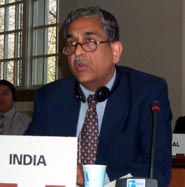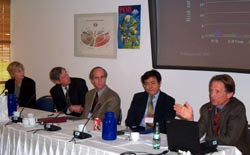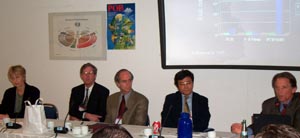 |
 Supporting the G-77/CHINA's call for a new fund, INDIA
noted the similarities between the future POPs convention and
the Montreal Protocol, and highlighted the success of the Protocol's
independant financial mechanism. "Delays occure ecause of poor
systems or lack of will, not because a new organization must be
set up."
Supporting the G-77/CHINA's call for a new fund, INDIA
noted the similarities between the future POPs convention and
the Montreal Protocol, and highlighted the success of the Protocol's
independant financial mechanism. "Delays occure ecause of poor
systems or lack of will, not because a new organization must be
set up."
|
|
 The
Ministry of the Environmant of the Netherlands and Commonweal USA
presented a "State of the Science Briefing" to inform
INC participants of recent developments in the rapidly evolving
science on POPs endocrology. This session's emphasis was on the
Precautionary Principle and the need for action despite absolute
scientific certainty. Dr. J. Peterson Myers, W. Alton Jones Foundation
and author of Our Stolen Future (far right), spoke of the
recent paradigm shift amongst endocrologists, who now accept that
major long-term harm can be done to the human body (especially the
fetus) with only short exposures to small amounts of certain toxins
which has lead to the re-evaluation of the concept of 'acceptable
background exposure' for many chemicals. Previously, the scientists
placed emphasis on the immediate effects of massive exposures.
Dr. Taisen Igushi,
Dept. of Biology at the Yokohama City University (second from the
right), presented his study entitled Detection of Endocrine Disrupters
in Human Umbilical Cord. He discussed the various ways a mother's
age and consumption habits can effect the type and quantity of toxins
she passes on to her unborn and nursing child. The
Ministry of the Environmant of the Netherlands and Commonweal USA
presented a "State of the Science Briefing" to inform
INC participants of recent developments in the rapidly evolving
science on POPs endocrology. This session's emphasis was on the
Precautionary Principle and the need for action despite absolute
scientific certainty. Dr. J. Peterson Myers, W. Alton Jones Foundation
and author of Our Stolen Future (far right), spoke of the
recent paradigm shift amongst endocrologists, who now accept that
major long-term harm can be done to the human body (especially the
fetus) with only short exposures to small amounts of certain toxins
which has lead to the re-evaluation of the concept of 'acceptable
background exposure' for many chemicals. Previously, the scientists
placed emphasis on the immediate effects of massive exposures.
Dr. Taisen Igushi,
Dept. of Biology at the Yokohama City University (second from the
right), presented his study entitled Detection of Endocrine Disrupters
in Human Umbilical Cord. He discussed the various ways a mother's
age and consumption habits can effect the type and quantity of toxins
she passes on to her unborn and nursing child.  Dr.
Rudy Boersma, University Hospital of Groningen, the Netherlands
(second from the left), discusssed the findings of a joint study
between universities in the Netherlands, Germany and Denmark on
the prevalence of PCB and dioxin in breastmilk. He said that despite
the disturbing levels of POPs and other toxins in human milk, breast-feeding
remains an invaluable source of nutrition for children and should
be encouraged. Dr. Ted Schettler, Boston Medical Center and author
of Generations at Risk, spoke on the effects of pre- and
post-natal exposure to POPs on cognitive and motor development.
The type and intensity of the effect an exposure to POPs will have
in an individual are almost impossible to predict, given the complex
interaction between contaminents, the importance of the timing and
amounts of the exposure, and variations in individuals' physiologies.
He reminded participants that the Precautionary Principle does not
negate science, but instead recognizes its limits and acts on these.
Sharyle Patton, Commonweal, moderated the panel. Dr.
Rudy Boersma, University Hospital of Groningen, the Netherlands
(second from the left), discusssed the findings of a joint study
between universities in the Netherlands, Germany and Denmark on
the prevalence of PCB and dioxin in breastmilk. He said that despite
the disturbing levels of POPs and other toxins in human milk, breast-feeding
remains an invaluable source of nutrition for children and should
be encouraged. Dr. Ted Schettler, Boston Medical Center and author
of Generations at Risk, spoke on the effects of pre- and
post-natal exposure to POPs on cognitive and motor development.
The type and intensity of the effect an exposure to POPs will have
in an individual are almost impossible to predict, given the complex
interaction between contaminents, the importance of the timing and
amounts of the exposure, and variations in individuals' physiologies.
He reminded participants that the Precautionary Principle does not
negate science, but instead recognizes its limits and acts on these.
Sharyle Patton, Commonweal, moderated the panel.
|